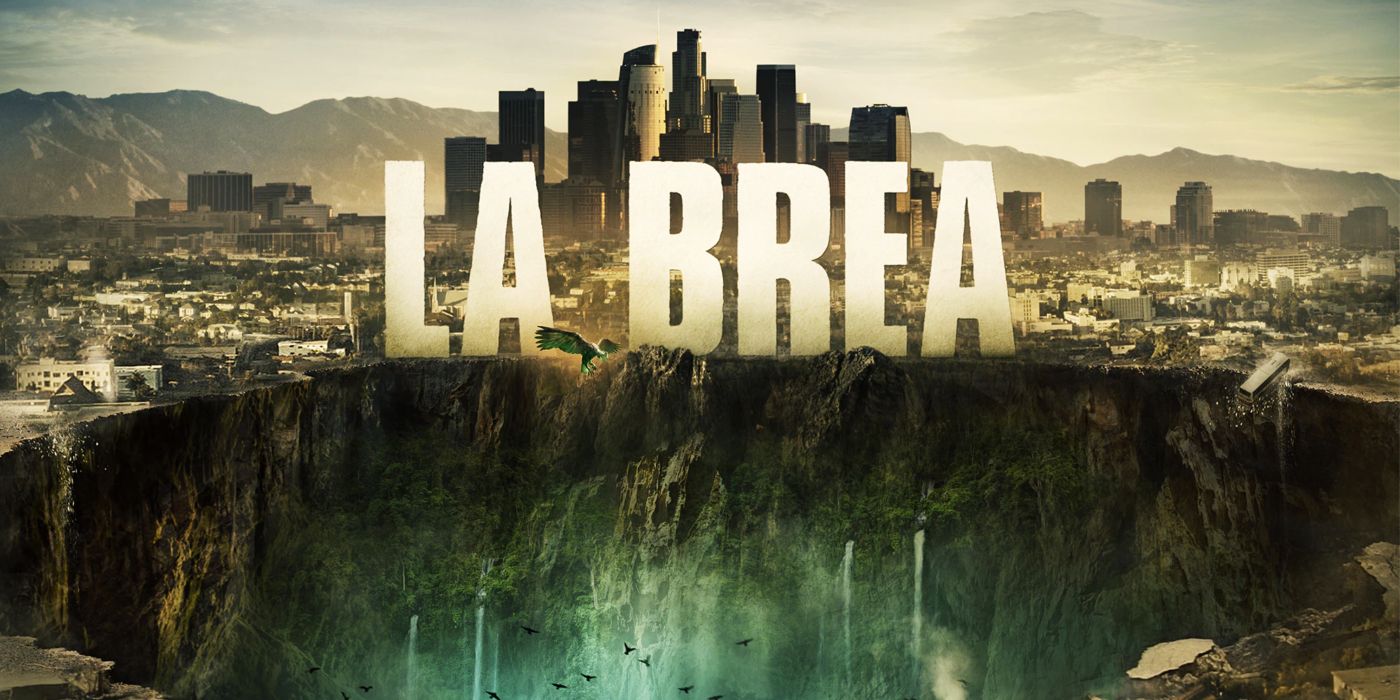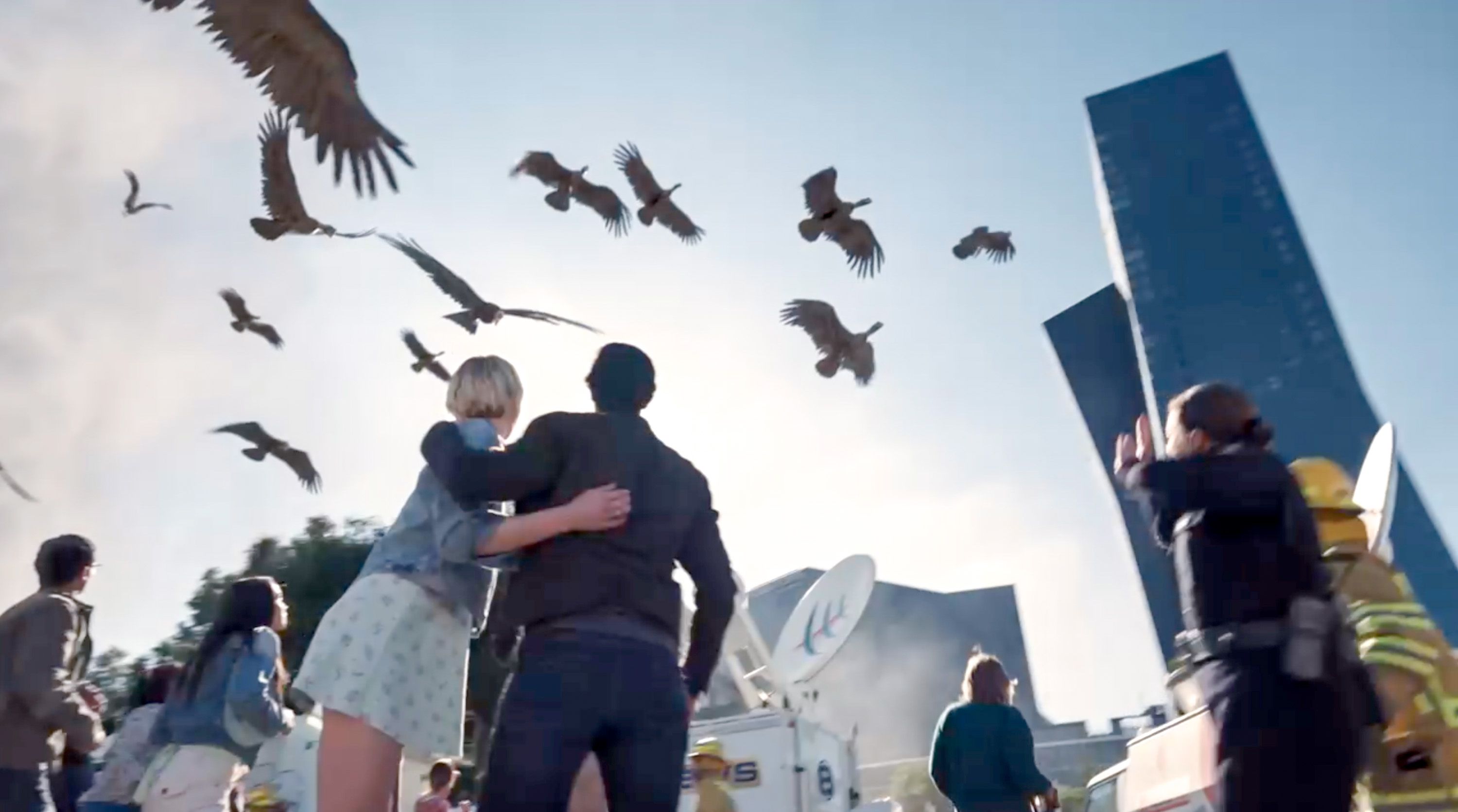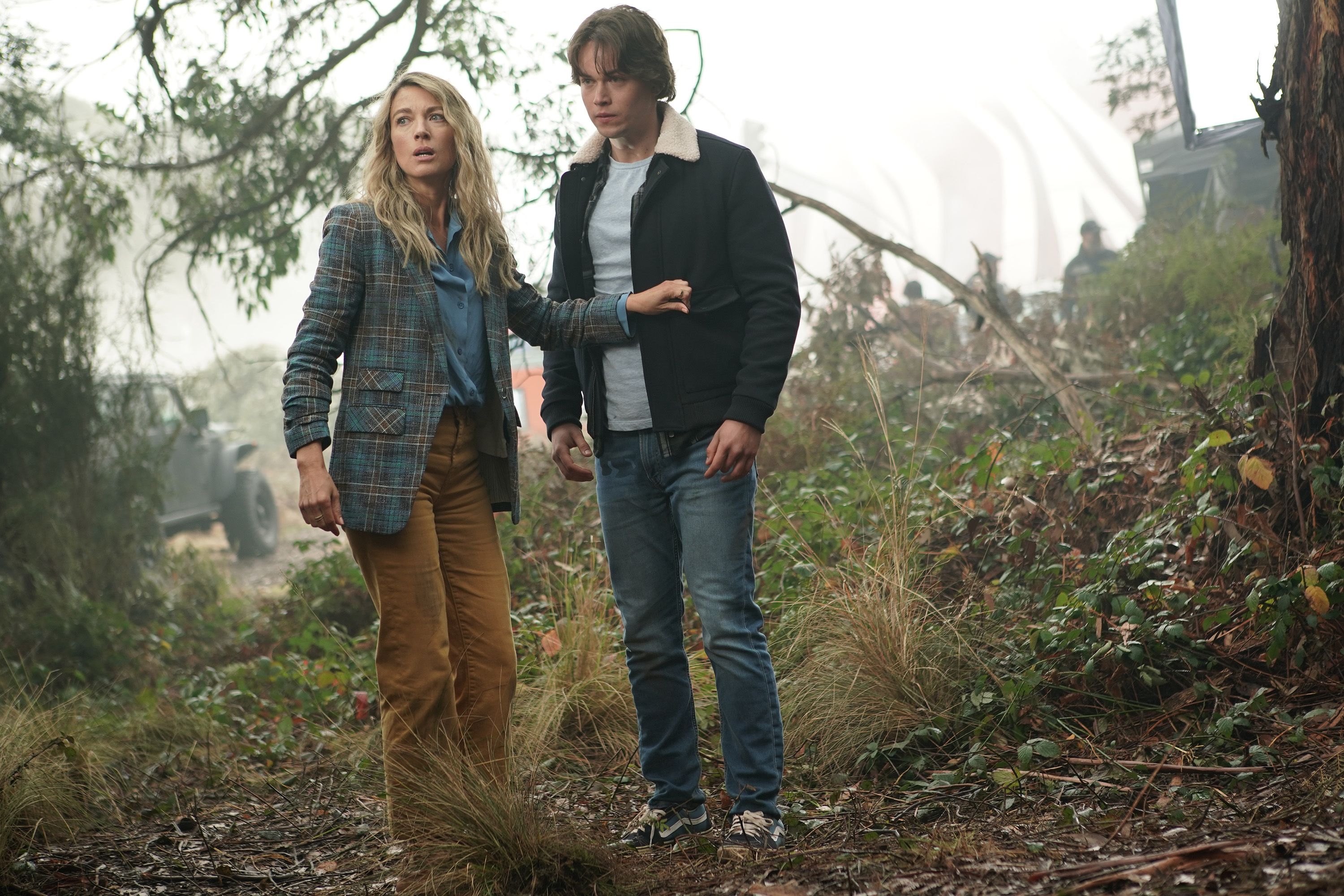Broadcast TV might not win the sorts of Emmys that it used to, but it's still a popular platform for surprising tales from the sci-fi and fantasy realms. La Brea, NBC's newest series to enter this arena, certainly begins with an attention-getting premise, as we watch dozens of Los Angeles residents fall into a massive sinkhole that deposits them into a strange land far from their homes.
What happens next is, of course, what executive producers David Appelbaum, Bryan Wynbrandt, and Steven Lilien hope the viewer is asking, and in the below interview with Collider, they reveal... well, not a lot in terms of specifics. But they do explain how they plan for the show to work week by week, how much plot they may have to burn through every episode, and why there's a prominent mention of the seminal ABC series Lost in the pilot.
[Editor's note: The following contains spoilers through the Season 1 premiere of La Brea, "Pilot."]
Collider: To start off, tell me the origin story of how you all came together to work on this show?
DAVID APPELBAUM: Well, two years ago, I pitched the idea to NBC, and they bought the pilot. And we started shooting the pilot in the winter of 2020, and then we were shut down because of the pandemic. But then after that, NBC has been so supportive of the project throughout. And they wanted us to start up a writer's room, a mini-room for first six episodes. And that's when Steven and Bryan came on as co-showrunners with me on the show, and we started flushing out the first season and writing it together. That was over a year ago, and we've been doing it together ever since.
So, Bryan and Steven, you came in with this already in motion. What were the initial conversations like?
BRYAN WYNBRANDT: Well, initially, we were really drawn to the material and Dave's great pilot script. And so when we started talking about where the season would go, we all did kind of a think tank and came up with a lot of different ideas for where we can take things. And I think the most exciting part of it is the alchemy that came between the three of us. We started to really riff and kind of take the show in a direction that was like exciting and unexpected.
STEVEN LILIEN: We were just so drawn. It's a visceral pilot. It has a strong family connection, which we responded to, which I think will emotionally hook the audience. Yes, it's visually impressive, but I think the character work is really strong. And I personally just love the way that Dave ended the pilot, as everyone will see, in such a dramatic way that makes you want to come back to episode two, that you have to tune in. It felt really binge-worthy. And I think when we came on the show, it was how do we duplicate that every episode? Let's give this audience an experience that matches a modern-day viewing, which is I need the next episode now. Yes, you'll have to wait a week, but it'll be worth it.
So in the pilot, you have the character of Scott joke that "maybe we're in an episode of Lost." It's a good, funny joke, especially given the circumstances, but I really wanted to dig in and ask, when including a line like that, are you actively courting comparisons? Or are you just acknowledging that in the world of this show, the show Lost also exists?
APPELBAUM: I think the reason for it was that ... The comparisons to Lost at this point are inevitable, and it was kind of a tongue-in-cheek way of going right at it. And it's true. I love Lost. It's a fantastic show, and there are comparisons: It's about a diverse group of survivors who are trying to figure out how to get by, and figure out where they are and how they're going to get home.
But the show does go in a lot of different directions after that. We have a much different cast of characters. The world that they're inhabiting is very different. Really, it was just a joke. The show does have a lot of humor to it as well, so this was one way to highlight that, but also just to acknowledge that we're living in a world where those comparisons will be inevitable. So why not just have fun with it?
Sure, of course. What's interesting about it, too, is that I think a lot of people have had the experience of watching Lost or shows like it, where you're sitting on the couch saying, "Well, why don't they just do this or that?" Do you feel like that's going to be an element that you play with, just having characters try to outsmart the situation they're in?
APPELBAUM: That's an interesting question. One of the important characters in the show is the character of Scott, who's someone who has great knowledge of the world that they're in, has this knowledge of history. And he's one of these people who is always going to be trying to think about the setting that they're in. So I think we will find moments to do that. But really, these characters are just trying to exist moment by moment. And so, that long game speak, those long game ideas. certainly be a part of it. But I think more week-to-week, it's about the survival aspect and trying to figure out where they are and how they're going to get home.
In the pilot, you have the element of them finding Eve's wedding ring in present-day Los Angeles, which I feel means that viewers will be thinking, "Oh, well, that establishes that there's a time travel element to this." How fast do you think we can anticipate things like the people in the clearing and the people in L.A. figuring out a way to communicate with each other?
WYNBRANDT: That's a great question. That's a great question. And I think you're going to have to tune in find the answer to that. I mean, we don't want to give anything away, but you're definitely in the right zone there.
LILIEN: Yeah. I think Scott's character, like Dave was saying, is someone who is more curious about the world that he's fallen into than necessarily even maybe getting home at this particular second. And I think he's going to really help the audience by asking those larger questions about where they are and when they are. And we'll get into that really quickly in Episode 2.
WYNBRANDT: And Scott being the pop culture guy, he doesn't feel stop with his Lost comparisons. You'll see. He's somebody who funnels it, for the audience, down to the pop culture reference essentials, and that's a fun part of it as well.
Do you have a sense that you have to burn through a lot of plot in order to keep a show like this going, in an era like today?
APPELBAUM: That's one of the really important things of the show, is that we're always having twists and turns and surprising the audience and keeping them on the edge of their seat and not knowing where it's going. So we do go through a lot of story in a really fun and exciting way. But at the same time, we always try to find moments to slow the stories down, that we can focus on the characters and understanding their emotional arcs and their stories.
Every episode is going to be a thrill ride to a certain degree, and that will involve twists and turns, but we're always trying to find the spaces in between. Once we start getting further into later episodes, we really start to flesh out these characters even more, and we understand who they are. And the emotional stories start to take more center stage as well.
Excellent. Not to keep bringing it back to Lost, but there was a document that Damon Lindelof and JJ Abrams wrote, right around the time Lost got picked up as a series, where they talked through the show and what people could expect from it. And one of the things they mentioned in the document is that Lost could be any show: One week it's a courtroom drama. One week, it's a medical show. One week it's a murder investigation. That isn't something necessarily that played out over the course of that series, but do you have in your heads that the idea that this show could essentially explore multiple genres over the course of its run?
APPELBAUM: That's interesting. That's not something that we've really investigated too much in the way that making an episode a courtroom show or a medical show, but one of the things that's really important to the show is that there is an adventure-of-the-weak quality to it. Every episode does have a beginning and a middle and end. And it is self-contained in that way while, at the same time, we're carrying through different serialized stories that arc out over the course of the season. But as far as putting it in a genre of a medical show or a police show, it's not something we've really talked about specifically. There is a medical story in the pilot, and there are developments in other episodes, but it's not really something we've really consciously tried to emulate.
LILIEN: I think the spirit of that document and what they were saying was, it all has to feel organic to the story that you're telling — you can get the feeling of what is a courtroom version of Lost by putting a character on trial. I think it all comes down to that, and you have to make it specific to learning more about the characters, because you just dropped into this world with them, and you're stuck.
But I think the thing that sort of separates this show right from the bat is obviously you're in a completely different world and it's different stakes. Yes, you have people who have to band together. But I think coming out of the pilot, you have this sense that there is this dangling way for people to get home, this light in the sky that seemingly connects these two worlds.
So it's like close enough that you can see it, but far enough that you can't quite get there. And I think that's a really strong drive for our characters is, how do we get back home? And the people up top wondering, "How can we bring them home?" And knowing that right now, there's a way, but how do you make that happen? And I think that's, we're trying to focus on this first couple episodes is not yet go into survival mode, but how do we get home?
WYNBRANDT: Also, we have the up top story. We have the world of Los Angeles, which is unique to this show. We have people who are part of the central mystery that aren't in the world and where it all is taking place. They're trying to get there, as Steven is saying. And I think the relationship between Izzy and Gavin is one of the strongest elements of the show, and you get that more and more each week. And you also get to know our characters within the government who are investigating this. And they become not just part of the plot, but we get to know them. And we get to feel the journey that they're on as well, because there are emotional stakes for them as well, baked into the story.
To wrap things up — in your heads, how many seasons does this show run, if you have your way about it?
APPELBAUM: That's a great question. One of the really good things about this process, even though it's taken two years to get from inception to screen, is that we've had a lot of time to sit and ponder and think about where the show would go. So we have a lot of big plans for what we want to do in future seasons.
We don't want to nail ourselves down to, it's going to be this X many seasons. But we think because it has such an interest group of characters who have their own stories. And it's also a world that has lots of mysteries that are unfolding. And as soon as you solve one mystery, another one opens up. We think it really has a potential to go for multiple seasons. But as far as like X number of seasons, that's not something that we've tried to nail ourselves to.
As a quick follow up on that, do you have a break-glass-in-case-of-abrupt-cancellation plan?
APPELBAUM: This is a 10-episode season, and we've completed the filming of the first season. So the first season has great stories and great climaxes. So I think we're telling really interesting stories. But as far as if it gets canceled, it's not something that we're really thinking about. Our job is just to create great stories and make the audience want to come back week after week. So it's not something that we're really planning for. We're just trying to tell the most interesting story that we can.
So there's no worry about leaving unanswered questions on the table?
APPELBAUM: The truth is that we're just trying to make a compelling episode. And if other people are making that decision, that's kind of out of our hands. We've never been asked to construct our story "in case of," but I think that can be a tough way to approach story, a defensive way to approach story. So we're just trying to make the audience be compelled and want to come back.
La Brea airs Tuesdays at 9 p.m. on NBC.




